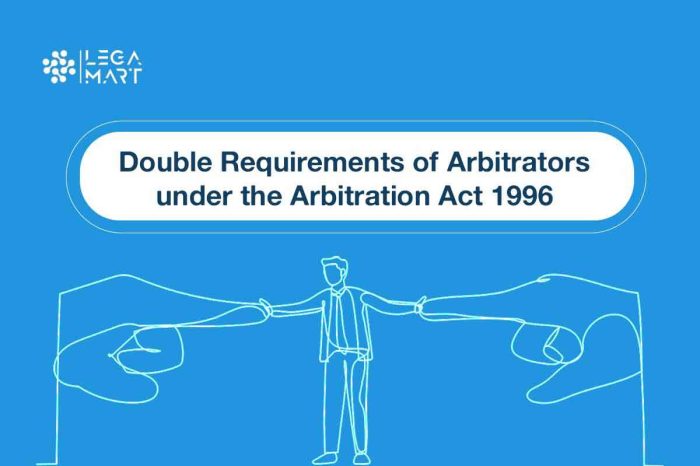Dispute Resolution Law
Arbitration
One method of alternative dispute resolution to settle civil disputes outside of court is arbitration.
The most prevalent ADR mechanism is international arbitration and conflict resolution (ADR). Any method of resolving a disagreement outside of court is called ADR. Arbitration, mediation, or other methods of dispute resolution may be used in ADR; it may also be optional or required.
-
What role does arbitration play in global commerce?
-
Clauses in some arbitration agreements
-
Adjudicative
-
Binding
-
Consensual
-
The arbitration agreement
-
Typical legal issues in international arbitration
What role does arbitration play in global commerce?
The majority of international business agreements drafted by attorneys contain a dispute resolution and governing law clauses that typically state:
- All disputes under the agreement shall be resolved by arbitration;
- The arbitral award shall be conclusive and binding and shall not be subject to review;
- The location of the arbitration; and
- The arbitral award shall be final and binding.
- The arbitration agreement’s language
- The contract’s applicable law.
Clauses in some arbitration agreements
A necessity for mediation prior to arbitration How many arbitrators there will be and how the chair will be chosen, as well as if the arbitration will be ad hoc or institutional. How the arbitrators will be chosen, with restrictions like nationality – Reserve the right to file a lawsuit in order to obtain injunctive relief or equitable remedies -The arbitration’s rules of process, including whether or not the award is subject to appeal. Arbitration’s ABCs are adjudicative, binding, and consensual.
Adjudicative
There cannot be a conflict of interest for the arbitrator.
- refrain from reaching out to a party on your own.
- Treat the parties equally and fairly, allowing each to state their case.
- behave legally by abiding by all rules and regulations.
- Let each party address the arguments made by the other.
- Must respect the parties’ agreement and the mandate’s parameters.
- Make a written decision within the allotted time and include reasoning.
Binding
Unless one of the adjudicative principles has been violated, unless there is a public policy reason not to do so, or unless an appeal is pending, the Court will convert an arbitrator’s award into a judgement.
Consensual
The arbitrator’s decision can only be enforced against parties that agree to take part in the arbitration. No outside parties are impacted.
A judge could not arbitrate disputes involving outside parties. The respondent is prohibited from selling his assets until the arbitration is resolved, according to an arbitrator’s order.
Because banks and employers were not parties to the arbitration, the judge determined that the arbitrator lacked the authority to issue a Mareva injunction.
A judge of the court has more power than an arbitrator does.
When there is a chance that the respondent would leave the country with his assets in order to avoid paying a future judgement, the unusual legal procedure known as a Mareva injunction is authorised. A Mareva injunction is typically acquired without prior notice, and the respondent’s job and banks are also named in the ruling. Court orders granting a Mareva injunction to a bank or employer must be respected and followed. If an arbitrator issues the order, the circumstances are different.
The arbitration agreement
Location, governing law, language, and rules
There are two additional formats for an arbitration agreement:
- A number of provisions in the parties’ commercial agreement that were made before any disputes ever occurred.
- A consensus regarding the dispute’s scope, rules, presentation of oral and documentary evidence, and hearing of witnesses after it has arisen.
This is an illustration of a commercial contract’s arbitration clause. There are countless varieties. “Any dispute arising out of or in connection with this contract, including any question as to its existence, validity, or termination, shall be referred to and finally and exclusively resolved by arbitration under the UNCITRAL Arbitration Rules before a panel of three arbitrators,” states the clause, which must be appropriate for the circumstances. A nominee shall be chosen by each party. Within 30 days, the nominees will choose a chair.
Typical legal issues in international arbitration
Choice of law: Parties to an international arbitration may be from many nations, each of which has its own set of rules and laws. The choice of law is a crucial matter that needs to be addressed because it may have an impact on how the dispute turns out. It may be difficult for the parties to reach agreement on the laws that will govern the dispute.
Jurisdiction: Another crucial legal matter in international arbitration is jurisdiction. The arbitrators’ jurisdiction and the laws that will be used to resolve the issue must be agreed upon by the parties. The arbitrators must be able to render decisions that are legally binding on both parties.
Language: Another crucial factor in the arbitration process is the language that will be utilised. The language to be used in the arbitration procedures, as well as any possible translation needs, must be agreed upon by the parties.
Award enforcement: The fact that judgements from international arbitration are typically enforceable under international treaties in the majority of nations is one of its advantages. Yet, there are some legal challenges that may come up when awards are enforced, such as concerns about the award’s recognition or the reasons for disputing it.
Confidentiality:In most cases, the parties to an international arbitration agreement agree to maintain the confidentiality of both the arbitration process and the award.
Find Best Lawyers and Legal help in
Latest Articles
Hamid Bagherzadeh
- March 4, 2020
Hamid Bagherzadeh
- February 27, 2020
Tell us more about your problem.
Please give a brief description about what it is you need to talk to our lawyers about ?
Frequently Asked Questions
What are the advantages and disadvantages of arbitration for international entrepreneurs and businessmen in the UK, China, South Africa, or Brazil?
The advantages and disadvantages of arbitration can vary depending on the country in which it is being conducted. Here are some potential advantages and disadvantages of arbitration in the UK, China, and Brazil:
UK:
Advantages:
The UK has a well-established legal system that supports arbitration.
English law is commonly used as the governing law in international commercial contracts.
The UK’s arbitration laws are considered to be modern and progressive, providing parties with flexibility and autonomy.
Disadvantages:
Costs can be higher compared to other jurisdictions.
Enforcement of awards may be difficult in certain countries.
There is limited government support for arbitration.
China:
Advantages:
China has a large and growing economy, making it an attractive market for businesses.
China has made significant improvements to its legal system in recent years, including supporting the use of arbitration.
The China International Economic and Trade Arbitration Commission (CIETAC) is one of the most popular arbitral institutions in the world, with a reputation for efficiency and fairness.
Disadvantages:
The Chinese legal system can be complex and unfamiliar to foreign parties.
There are concerns about the independence and impartiality of arbitrators in China.
The enforcement of awards can be difficult, particularly for foreign parties.
Brazil:
Advantages:
Brazil is home to a large and growing economy.
The Brazilian legal system is considered to be well-developed and sophisticated.
Brazil has a number of reputable arbitral institutions, such as the Sao Paulo Chamber of Commerce Mediation and Arbitration Center.
Disadvantages:
Court intervention in arbitration proceedings can be more common in Brazil compared to other jurisdictions.
The language barrier can be a challenge for foreign parties.
The cost of conducting arbitration in Brazil can be high.
Overall, whether arbitration is a good option will depend on the specific circumstances of the dispute and the parties’ preferences and goals. It is important to carefully weigh the potential advantages and disadvantages before deciding whether to pursue arbitration in any country.
What are the legal frameworks governing arbitration in these countries?
The legal frameworks governing arbitration in the UK, China and Brazil are as follows:
UK:
In the UK, the main legislative framework for arbitration is the Arbitration Act 1996. This act codifies the law on arbitration in the UK and provides a modern and flexible framework for parties to conduct arbitrations.
China:
In China, the primary legal framework for arbitration is the Law of the People’s Republic of China on Arbitration (the Arbitration Law). The Arbitration Law sets out the procedural rules for arbitrations conducted in China and governs the enforcement of arbitration awards rendered in China.
Brazil:
In Brazil, the main legal framework for arbitration is the Brazilian Arbitration Law (Law No. 9.307/96), which was modeled after the UNCITRAL Model Law on International Commercial Arbitration. The Arbitration Law provides a comprehensive set of rules governing arbitrations conducted in Brazil, including the procedures for selecting arbitrators, conducting hearings, and rendering awards.
In addition to these legislative frameworks, there are also various arbitral institutions operating in each country that provide additional rules and guidelines for conducting arbitrations. For example, in the UK, the London Court of International Arbitration (LCIA) provides a set of institutional rules for international arbitrations. In China, the China International Economic and Trade Arbitration Commission (CIETAC) is a popular arbitral institution that provides procedural rules for arbitrations conducted in China. And in Brazil, the Sao Paulo Chamber of Commerce Mediation and Arbitration Center is one of the leading arbitral institutions, providing rules and guidance for arbitrations conducted in Brazil.
What are the alternatives to arbitration available for resolving business disputes?
There are several alternatives to arbitration that may be available for resolving business disputes. Here are some of the most common:
Negotiation: In many cases, parties may be able to resolve a dispute through direct negotiation without the need for third-party intervention. Negotiation can be informal or formal, and may involve lawyers or other representatives.
Mediation: Mediation is a process in which an impartial third party (the mediator) assists disputing parties in reaching a mutually acceptable resolution. Unlike arbitration, mediation is non-binding, meaning that the parties are not obligated to accept any proposed settlement.
Litigation: Traditional litigation, or going to court, is another option for resolving business disputes. In litigation, a judge or jury hears evidence and arguments from both sides and renders a decision.
Expert determination: Expert determination involves the appointment of an independent expert who is qualified in the relevant field to make a binding decision on a specific issue or dispute.
ADR hybrid processes: There are also various hybrid processes that combine elements of different ADR methods, such as med-arb (a combination of mediation and arbitration) or arb-med (a combination of arbitration and mediation).
The choice of dispute resolution method will depend on various factors, including the nature of the dispute, the complexity of the issues involved, and the goals and preferences of the parties involved. It’s important to carefully consider all available options before choosing a particular method.














